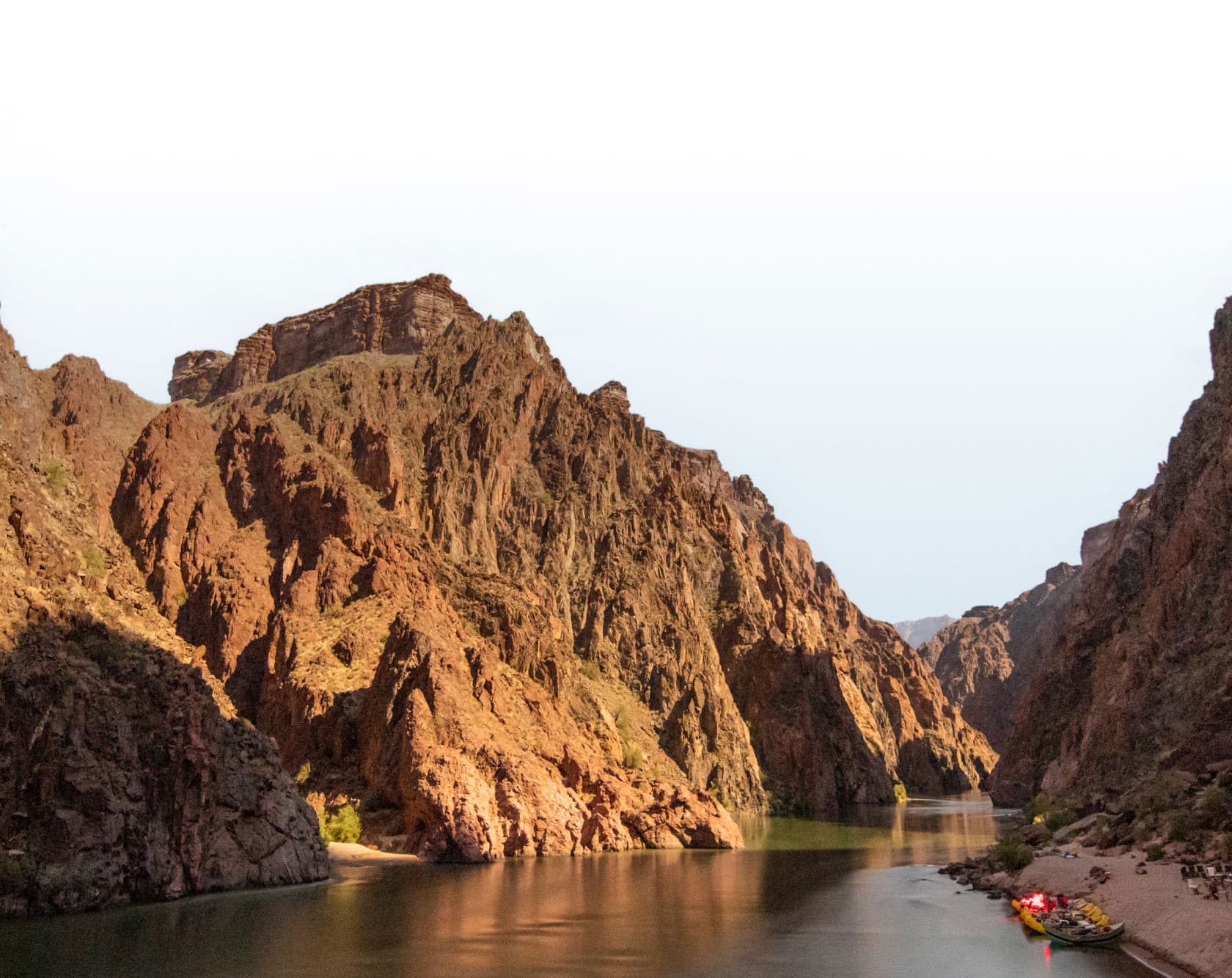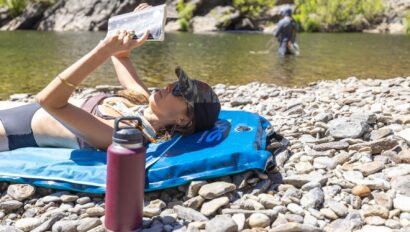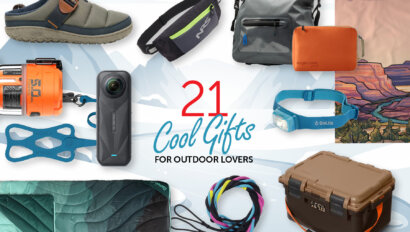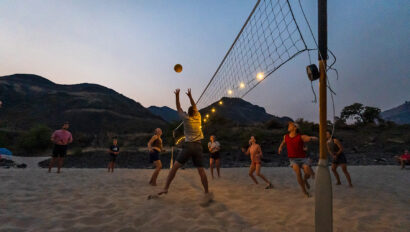

Make Your Next Camping Trip Effortless and Comfortable
For many folks, car camping means you are roughing it.
I’ve spent many a night outdoors lying uncomfortably in the dirt, just willing sleep to come as a partially re-hydrated meal digests in my stomach. I’ve been crammed into tents and slept with rocks digging into my hip bones. And, I’ve used a not-puffy-enough jacket as a pillow only to wake up with the inability to look over my right shoulder thanks to the kinks in my neck.
Despite all this, I have always loved camping. And luckily, I stuck with it long enough to learn a few camping hacks that have turned my terrible nights spent outdoors into comfortable and easy experiences. Once I amassed the right gear, learned that a little food prep goes a long way, and figured out just how much stuff I could pack into my car and not end up with a completely disorganized mess, spending a night car camping was as relaxing as a night I spent in my own home.
Make your next car camping trip effortless and comfortable with these gear essentials and time-tested tips that you can add to your camping repertoire.

Dial in the Creature Comforts
Some campers like to bring everything but the kitchen sink while others prefer to bring only the essentials. I like to keep it simple while prioritizing sleeping well, eating well, and having fun.
Car camping is about checking your ego—if you know something will make you comfortable but aren’t sure if you will look outdoorsy or hardcore if you bring it, throw it in the car anyway. Camp slippers (okay, pink Crocs), lawn chairs, a hula hoop, a roomy, six person tent—these are all things that don’t look very elite like some of my backcountry camping gear but come with me every time I car camp.
Everyone has their own pastimes and comforts that can make or break a camping trip. Whatever it is, a ukulele or a camping game, a fleece blanket or your old film camera, add it to the packing list if you are car camping and know you’ll have some down time on your hands.
Stay Warm, Stay Cozy
If you sleep cold or are worried about the weather, you can always throw in an extra blanket or purchase a puffy camp blanket, like the Original Puffy Blanket made by Rumpl.
If winds howl and the rain picks up while you are car camping, you can use your vehicle as a windbreak. I also always throw in some extra trash bags as a waterproof layer to keep my things dry and clean if it’s wet or damp. And pop-up tents aren’t just for shade, they also work well to keep the rain off the cooking area or even above your tent if you don’t trust your rain fly. The more tarps the better if weather is an issue. I use them to sit on and create makeshift shelters for eating and relaxing while camping.
Another way I keep warm when camping is to bring another layer of insulation to put between my body and the ground. I like to bring my yoga mat along and roll it out underneath my sleeping pad. It’s also nice to have it handy when I feel like stretching before bedtime after I’ve spent the day outside.

Speaking of sleeping pads—if you are more of a car camper than a backpacker, definitely invest in a cushy pad with foam as well as air. My friends who are river guides swear by a paco pad for any type of camping where you don’t have to hike everything in on your back. Check out this guide to different types of pads if you are in the market for a new one.
For me, the one thing that I’ve learned will make or break a night’s sleep is a pillow. I tried to tough it out for years without one before finally giving and investing in a camping pillow. I have also been known to grab one off the bed when I leave home, and it makes a world of a difference.
Stock Your Camp Kitchen
Setting up camp involves more than just pitching a tent, it’s also about preparing a good meal. If you are used to roughing it and packing light, throw everything you thought you knew about camp cooking out the window.
Keep all the smaller kitchen items like knives, cutting boards, wet wipes, spices, tea and instant coffee, and non-perishables like oatmeal and ramen in a plastic bin. I like to put Sriracha and other hot sauces in little plastic bottles and store them with my camping gear so they are ready to go when it’s time to pack the car.
A camp table can be basic or fancy
, but in either case it’s a simple addition that doesn’t take up too much space in the car (lay it flat on the bottom of your trunk) but adds a ton of comfort in the at the campsite, especially if you are planning on camping somewhere without picnic tables. Camp chairs should also make the list of essentials.
If you are camping in an area with bears, it’s a good idea to invest in a bear-proof container and leave it a ways away from your tent and car when you tuck in for the night. If bears and larger animals aren’t a concern, you should be ok putting food in the car while you sleep or in a sealed container, but know that squirrels, mice, and other creatures will chew through bags and tents if they smell food inside. If you aren’t sure the best food practices for wildlife in the area you plan on camping, check with local land agencies or campground managers.
Make Your Belly—and Your Tastebuds—Happy

I have friends who see camping as a time to take a break from fancy cooking—if that sounds like you, then bring on those dehydrated meals and tortilla PB&Js. There’s no reason why you can’t also create a gourmet meal over a camp stove, however. Lentils, pasta, precooked sausages, fresh vegetables, eggs, canned beans, and cheese all cook up quick and make great ingredients for a frontcountry camp meal. If you plan on bringing a lot of food, have one cooler for drinks and another for your ingredients, and leave them in the shade whenever possible.
While I like to have instant coffee on hand as a backup, I usually enjoy a steaming cup of french press as I pack up my camping gear. Coffee presses like this one from GSI Outdoors double as a to-go mug and are one of the many things designed for camping that I find myself reaching for during my daily life, as well. I like to bring single servings of milk or almond milk—the kind that don’t need refrigeration until they are opened—as creamer.
There are a few other no-brainers that I don’t always use but regret it when I need them and don’t have them like a small shovel for putting out campfires or a multi-gallon jug so I never have to worry about my water supply. A must-have in certain areas (do your research about where you plan to camp) is a fire permit if you want to build a campfire.
Shine Some Light (and Power Up)
Headlamps will always be my go to, but if you want to feel fancy, invest in a few fun solar lights, like the inflatable and lightweight Luci lights by BioLite. To step up your lighting, decorate your tent or camp table with battery-powered LEDs
.
While I love going totally off the grid as much as the next gal or guy, I have definitely charged my devices in a campground for the sake of my amateur photography hobby and to have a working cell phone in the wild for safety reasons. I love having small, portable, and affordable solar chargers that can also be charged up at home before I head outside like this one from Goal Zero. A more expensive but longer lasting alternative would be these mammoth chargers
, but remember you need to budget the space for them in with all your camping equipment.
Tidy Up—Right Away
Car camping can feel like a lot of work, but if you stay organized and on top of the cleaning, it can become a lot more effortless.

Keeping food and sleeping equipment separate and organized is a must. The first thing you will want to do is set up your tent and bedding, then figure out where your cooking and dish area will be. I like to use compact camping dishes, so they stay organized, and a multi-bin diswashing system. Set paper towels and toilet paper somewhere dry and easily accessible, and use bathing wipes to clean up grubby hands and toes before bed. You can also rig a jug of water for washing hands and dishes on a tree or table.
Also, always remember to Leave No Trace. It’s one of, if not the most important thing to do as a camper whether you are in a remote dispersed campsite or one close to home with plenty of other campers nearby.
When the camping trip is over, I like to store all my gear, including sleeping bags, tents, backpacks, coolers, and cooking equipment together and in a way that is easy to load into my car. This makes packing for the next adventure all that much easier.
This post was originally published in May 2019 and has since been updated.
*Please note that some of the links above are Amazon affiliate links, and OARS will earn a small commission if you decide to make a purchase after clicking through the link.
Related Posts
Sign up for Our Newsletter





